Both the Bank of Japan and the Federal Reserve held policy meetings last week. The Fed continued to increase U.S. rates by 25 basis points - the fed funds rate is now 4.25 percent. As can be seen on the graph below, the spread between U.S. and British rates has now narrowed to only 25 basis points and with Australia to 125 basis points. In contrast, the spread between European and U.S. rates, which momentarily narrowed to 175 basis points, is now 200 basis points again. And with Japan the spread gets ever wider as the BoJ extends its super easy policy of zero interest rates.

The Bank of Japan, amid a good deal of political rhetoric and speculation by bank watchers, left its monetary policy unchanged. Interest rates remain near zero and the Bank will continue to flood the market with cash as it has for 4 1/2 years in its fight against deflation. The BoJ kept the reserve target at between ¥30 trillion ($258 billion) and ¥35 trillion. In his post-meeting press conference, Bank of Japan Governor Toshihiko Fukui said that the Monetary Policy Board was close to ending its deflation fighting policy. The MPB thinks that the economy is achieving a well-balanced recovery which is steadily spreading throughout the economy. The Bank, he said, is also watching to see if core consumer prices (which excludes fresh food but includes energy) can achieve stable gains.
While an interest rate policy change may be on the horizon, its timing is at the center of a dispute between the BoJ and the government. Prime Minister Junichiro Koizumi has repeatedly insisted that deflation persists and it is too soon to stop fighting it. The government is concerned that a policy change may prompt investors to dump bonds, raising yields and the cost of servicing the nation's debt, which is projected to reach ¥774 trillion or 151 percent of gross domestic product by March.
The bank had raised rates in August 2000 in the face of government opposition, saying the economy had recovered sufficiently to cope with higher borrowing costs. Then seven months later in March 2001, it was forced to cut rates and adopt the quantitative easing policy again when global growth slumped after the Internet technology bubble burst. The BoJ has lifted the reserve target sevenfold since it adopted the policy. It has set three conditions that must be met for a change - core consumer prices stop falling for at least a few months; policy makers are sure they won't resume sliding; and the Bank is confident about the overall strength of the economy.
Ruling Liberal Democratic Party legislators have set up a committee to discuss the central bank's policy. The panel will urge the central bank to set joint economic policy goals with the government, with an aim to achieve a certain growth target. Kozo Yamamoto, the panel's chairman, told reporters yesterday the government and central bank should coordinate policies to achieve nominal economic growth of between 3.5 percent and 4 percent. The government has projected Japan's nominal growth at 1.3 percent this fiscal year (ending March 31, 2006). Fukui and other policy makers have said the bank will probably hold interest rates near zero even after it starts to reduce the amount of cash it injects into the banking system because prices won't likely rise quickly.
Now that the FOMC meeting is over...
Stocks became increasingly volatile as the end of year/holiday season drew closer. The yen continued its sharp rebound while interest in stocks in the major markets seemed to fade. Japanese stocks fell on concern that the higher yen would depress exporters' sales and profits. U.S. data were positive - that is, with the exception of the merchandise trade deficit which continued to burgeon. But the good data brought with it worries of future U.S. interest rate hikes. On the week, most indexes were up with the exception of the two Japanese indexes and the Nasdaq.
Global Stock Market Recap

Europe and the UK
Stocks in Europe and the UK closed the week on a positive note. German stocks benefited from utility stocks as well as the improving sentiment as evidenced by the ZEW and Ifo indexes. Friday's triple witching prompted greater volatility in indexes as investors adjusted their holdings of underlying assets. German stocks on Friday benefited from a better-than-expected reading in the Ifo confidence index as export-driven growth fueled spending at home.

Earlier in week, European stocks fell from four-year highs as the dollar dropped to its lowest level in more than a month against the euro, reducing the value of companies' U.S. sales. The euro's rise is adverse for exporters as prices for their goods go up. On the week, the FTSE was up 0.3 percent while its European counterparts, the CAC and DAX, were up 0.9 percent and 1.4 percent respectively.
Asia/Pacific
The yen's strength was not good news for Japanese exporters, and helped bring down the Nikkei and Topix last week. The Nikkei lost 1.5 percent while the Topix, 0.7 percent. The immediate cause was government plans to scrap income tax breaks adopted in 1999 to reduce the budget deficit. The ruling Liberal Democratic and New Komeito parties yesterday said Japan should abolish tax concessions for individuals and businesses by 2007. A possible end to the breaks could lead to a burden of ¥3.3 trillion ($28 billion) for taxpayers. Retailers' stocks sank on concern rising tax payments would hinder consumer spending. The concessions were introduced in 1999 as a temporary measure to spur consumer spending and help prop up stagnating economic growth. Japan's parliament passed a bill in March to halve the rebate to 10 percent in January.

Exporters such as carmakers and tech manufacturers were hit by the dollar's slide to its lowest level against the yen in a month. Most domestic sectors performed little better, as investors continued to show skepticism about recent market rises in the wake of Wednesday's weaker-than-expected Tankan survey. Sea transport - the most export-dependent sector - dropped.
Currencies
After drifting lower against the dollar, the yen did an abrupt about face and soared. The reasons are numerous including the possibility that the Federal Reserve may stop increasing U.S. interest rates. Other reasons abound including the continued improvement in the Japanese economy as evidenced in the Tankan survey for the fourth quarter (even though key numbers were below the optimistic consensus) and the Bank of Japan's upbeat forecast for the cessation of deflation and growth. But the Ministry of Finance is not shy about intervening if they find the currency too strong - and they have already warned that they are monitoring the situation.

The euro also gained on the dollar last week. Improved sentiment combined with easing inflation helped improve the currency. Sentiment now has turned on the ECB's 25-basis-point increase on December first. The consensus seems to feel that the move would not hurt the fledgling recovery.

Indicator scoreboard
EMU - November harmonized index of consumer prices was down 0.2 percent but up 2.3 percent when compared with last year. The monthly decline was due to the decline in fuel prices. Core HICP which excludes energy and unprocessed food was up 0.1 percent and 1.5 percent on the year. Prices for clothing were up 0.5 percent and for food by 0.3 percent. Eurostat will change the HICP base year to 2005 from 1996 effective with January 2006 data.

Germany - December ZEW economic sentiment index soared to a reading of 61.6 from 38.7 in November. Contributing to the gain was stronger equity markets, a weaker euro, lower oil prices as well as the apparent willingness of companies to invest. The monthly survey is conducted by the Mannheim-based Center for European Economic Research (ZEW). ZEW surveyed 317 German financial experts for their opinions on current economic conditions and the economic outlook for major industrial economies between November 28th and December 12th.

December Ifo business climate index jumped to 99.6 from 97.8 in November. The index showed that business confidence increased to the highest in more than five years. The confidence index is derived from a monthly survey of 7,000 executives.

France - October merchandise trade deficit widened to €2.463 billion from a deficit of €1.534 billion in September. Exports dropped 3.0 percent after a 1.5 percent gain in September. The ministry said the decline in exports was particularly noticeable in capital goods and automobiles. In contrast, exports of unfinished goods, consumer goods and energy products remained strong. Imports were virtually unchanged in October. A modest increase in unfinished goods, consumer goods and capital goods imports were largely offset by a drop in purchases of foreign automobiles.

Italy - October workday and seasonally adjusted industrial output sank 0.9 percent and was down 2.7 percent when compared with the same month a year ago. The declines were everywhere. Consumer goods dropped 1.2 percent, investment goods declined 0.7 percent, intermediate goods sank 1.4 percent and energy goods were down 1.0 percent.

October world merchandise trade deficit was €261 million, significantly smaller than September's deficit of €2.4 billion. In October 2004, the trade balance had a surplus of €199 million. Exports were up 3.3 percent but imports soared by 5.1 percent primarily driven by energy and consumer goods purchases. Istat said that much of the 2005 deficit was due to increased energy costs.

Britain - November producer output prices were down 0.2 percent and up 2.3 percent when compared with last year. Excluding food, beverages, tobacco and petroleum, output prices edged up 0.1 percent and 1.3 percent on the year. Food prices were up 0.5 percent and chemical products were up 0.7 percent but petroleum products were down 3.3 percent on the month. Producer input prices were up 1.4 percent and 12.7 percent on the year. Core input prices were up 1.6 percent and 8.7 percent on the year. Crude oil prices were down 3.1 percent but all other categories were up on the month.

November consumer price index was unchanged and up 2.1 percent when compared with the same month a year ago. Transport prices - such as those for airfares and gasoline - declined. Retail price index excluding mortgage interest payments was up 0.1 percent on the month and up 2.3 percent on the year. The CPI is used primarily for monetary policy purposes while the retail price index is used as a parameter for things such as wage increases and the like.

Average earnings growth for the three months to October slowed to 3.6 percent from 4.1 percent when compared with the same three months a year ago. Excluding bonuses, average earnings dropped to 3.9 percent in October from 4.0 percent in September. Private sector earnings dropped to 3.5 percent from 4.1 percent, while public sector earnings dipped to 4.1 percent from 4.2 percent.

November claimant count unemployment was up by 10,500 and the claimant count unemployment rate remained at 2.9 percent for the second month. For the three months through October, the International Labour Organisation measure of unemployment was up 72,000 on the previous three months. The ILO unemployment rate jumped to 4.9 percent from 4.7 percent in the previous three months.
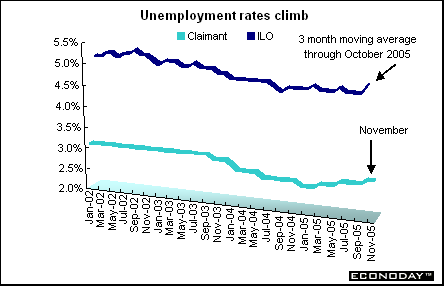
November retail sales were up 0.7 percent and 2.1 percent when compared with last year. Food store sales were up 0.5 percent and 2.8 percent on the year while non-food sales were up 0.8 percent and 1.8 percent on the year. Non-store retailing was up 1.2 percent.
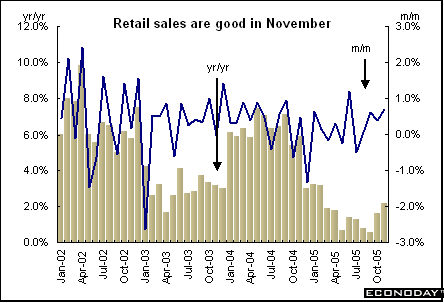
Asia
Japan - November corporate goods price index was unchanged on the month and up 1.9 percent when compared with last year. Prices for nonferrous metals and iron and steel scrap were up while gasoline prices were down.
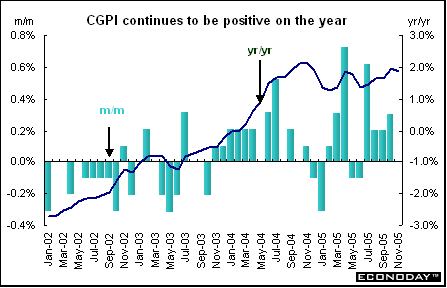
Fourth quarter large manufacturers Tankan survey climbed to 21 from 19 in the third quarter. Sentiment about major oil refiners and nonferrous metal makers showed a marked improvement in light of high crude oil and commodities prices while large wholesalers, retailers and food and beverage sectors reported sagging sentiment. The index for small manufacturers was 7, up from 3 in the previous quarter. The Tankan, which means short-term economic outlook, surveys more than 10,000 companies and is the most closely watched index of business confidence in Japan. It asks companies about their outlook for business including sales, profits, spending and employment. Companies were surveyed between November 10th and December 13th.
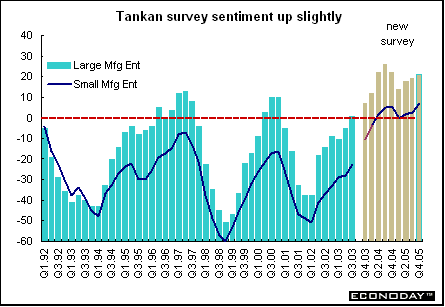
Americas
Canada - October merchandise trade surplus was C$7.2 billion, virtually unchanged from September. The surplus with the United States increased from C$10.7 billion to C$11.1 billion but remained below the January 2001 record high of C$11.3 billion. Exports to the U.S. soared by 2.3 percent while imports from the U.S. were up 1.5 percent. The deficit with countries other than the United States widened from C$3.5 billion to a record high C$3.9 billion. Exports were up 1 percent while imports increased by 1.2 percent. Natural gas exports were the main contributor to rising exports while shipments of lumber and sawmill products, passenger vehicles, and live cattle also registered gains. Exports to other trading partners fell 4.5 percent while imports edged up 0.7 percent.
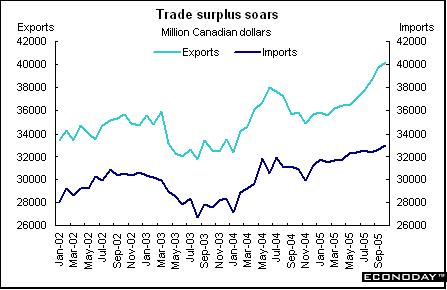
October manufacturing shipments were up 0.9 percent and 3.4 percent when compared with last year. The transportation equipment sector was again the key mover as a sizable jump in motor vehicle manufacturing boosted total shipments by 0.9 percent. Excluding the volatile motor vehicle and parts industries, total manufacturing shipments remained unchanged from September's level. Increased shipments were concentrated in 10 of the 21 manufacturing industries accounting for 57 percent of the total. Unfilled orders rose 1.4 percent to $42.5 billion in October, the eighth increase so far in 2005. Orders now stand at the highest level since December 2002. New contracts in the aerospace industry led to a 1.4 percent surge in unfilled orders. Excluding the aerospace products and parts industry, unfilled orders edged up 0.2 percent for the month. New orders were up 2.3 percent, more than offsetting September's 1.9 percent decline. Increases in aerospace and motor vehicle industries were responsible for October's surge in new orders. Excluding the transportation equipment sector, new orders declined 0.3 percent.
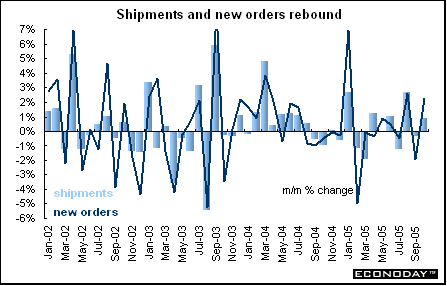
Bottom line
As attention switches full time to end-of-year festivities, markets tend to become volatile primarily due to thin volume. There will be some important data releases in Europe such as M3 money supply and the unemployment rates for both France and Italy. The usual end-of-month deluge of Japanese data will be closely watched by those that are not on vacation.
Investors should be in a cheery mood as we enter the holiday season. Overseas equities have had a very prosperous year, far outperforming U.S. stock indexes. And most gains will be in double digits. With the prospect of more countries participating in world growth finally becoming a reality, investors' choices will multiply.

